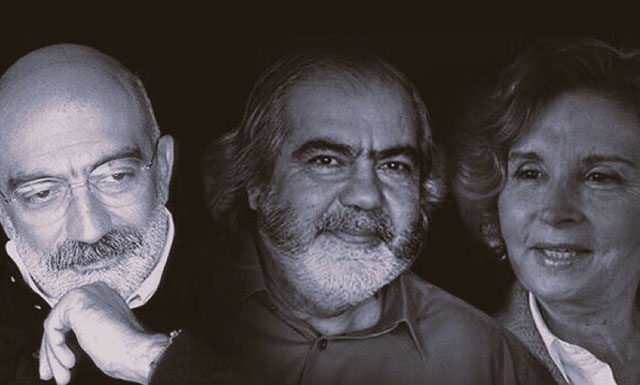Journalists and academics bear the brunt of the massive crackdown on freedom of expression in Turkey. Scores of them are currently subject to criminal investigations or behind bars. This website is dedicated to tracking the legal process against them.


Appellate court orders continued detention of five defendants, adjourns trial until October
The appeal hearing of a trial where six people, including renowned journalists Ahmet Altan, his brother Mehmet Altan, and Nazlı Ilıcak, were given aggravated life sentences on “coup” charges began at the 2nd Criminal Chamber of the Istanbul Regional Court of Justice on 21 September.
Presenting his final opinion on the case after defense statements from the six defendants and their lawyers, the prosecutor in the case insisted on the original charge, requesting that the defendants be given aggravated life sentences for “attempting to overthrow the constitutional order” under Article 309/1 of the Turkish Criminal Code (TCK).
The prosecutor argued that “all sorts of opinions and statements made by the defendants through various means of media” must be accepted as “threatening lives and property” and requested continued detention of the five imprisoned defendants.
In its interim ruling announced at the end of the hearing, the appellate court rejected requests from defense lawyers for the release of the five imprisoned defendants and adjourned the trial until 2 October to allow time for the defendants and their lawyers to prepare their final defense statements.
The defendants in the case include, in addition to the Altan brothers and Ilıcak, the former design director of the shuttered Zaman newspaper Fevzi Yazıcı, the daily’s advertisement director Yakup Şimşek and Şükrü Tuğrul Özşengül, a former Police Academy lecturer and media commentator. On 16 February 2018, the Istanbul 26th High Criminal Court convicted them of “attempting to overthrow the constitutional order” and sentenced all six to aggravated life imprisonment. Mehmet Altan was released by a decision of the appellate court on 27 June 2018, when it formally accepted the case, based on a Constitutional Court decision which found his pre-trial detention amounted to rights violation.
All six defendants attended Friday’s session at the appellate court and presented their defense statements, which consisted mainly of summarized versions of their defense statements throughout the original trial process.
Two witnesses who testified against the defendants but were not heard by the trial court in the courtroom, Nurettin Veren and a secret witness who goes by the alias “Söğüt,” were also expected to testify before the appellate court but it became apparent that “Söğüt” had testified on 19 September for the appeal hearing, again in the absence of defense lawyers and defendants, i.e. without cross-examination.
Nazlı Ilıcak: It is hard to stand trial on a charge as immoral as putschism
Veteran journalist Nazlı Ilıcak, who has been behind bars for two years as part of the case, was the first defendant to address the court during the appeal hearing.
Ilıcak said in her statement that the trial court did not consider any evidence she presented during the proceedings.
“I have been careful not to talk about my age at court,” the 74-year old journalist said stating her age for the first time, “ I have spent two freezing winters and two scorching summers in prison. It is getting harder to cope. I am afraid I might not survive if some problem arises. I believe I disproved the allegations against me. I demand to be acquitted.”
“It is very hard to be on trial for a despicable crime such as a coup. I am being tried in a manner no one deserves to be. There is no physical torture, but plenty of immaterial torture,” Ilıcak said as she wrapped up her defense statement.
Ahmet Altan: We were tried and convicted in a case that does not exist
In his defense statement, Ahmet Altan said that neither the trial, nor their conviction were lawful.
Altan said: “This curious case started with our arrests on the allegation that we sent ‘subliminal messages’ to coup plotters. This laughable claim resulted in aggravated life sentences for us. Turkey’s penal code does not include the term ‘immaterial force.’ The court that convicted us made up a crime that does not exist.”
A lawful case requires three conditions, Altan said, adding: “That an act must exist. That this act must clearly be described as crime. That there must be solid evidence showing it was perpetrated by suspect. Our case has none. There is no act we perpetrated, no law describing the sort of crimes included in case file, and therefore no evidence. We were tried and convicted in a case that does not exist.”
After Altan completed his defense statement, he read out an excerpt from the testimony of the secret witness “Söğüt” at the judge’s request. The secret witness claimed in his testimony that Altan had apologized for the publication in Taraf newspaper of a column that included critical comments about Fethullah Gülen.
In response to the allegations by the secret witness, Altan said that Taraf published many articles criticizing the Gülen group: “[Former Zaman publisher] Alaaddin Kaya came to me and said we were not being fair. And I wrote about it. Alaaddin Kaya called the next day and said I misreported something he had said at our meeting. I wrote that too, and apologized for my mistake. That is it.”
Denying the allegation by the secret witness that former Zaman publisher Alaaddin Kaya had a say in Taraf's editorial content, Altan said: “No one can tell columnists what to write in a newspaper that I manage.”
He added that he would file a criminal complaint against the secret witness for giving false testimony.
Altan said: “We were given the same sentence as those who actually bombed places [during the coup attempt]. I want evidence from you, not false witnesses.”
Mehmet Altan decries “immaterial force” claim
In his defense, Mehmet Altan criticized the trial court for upholding the prosecutor’s claim that he and his co-defendants were guilty of participating in the coup attempt through use of "immaterial force."
“The term ‘immaterial force’ is a product of fascism in Europe and the 1960 coup in Turkey. It is outdated, invalid,” Altan said. "We are faced with a shameful mentality that wants to criminalize innocent people, that puts people behind bars for no reason."
Mehmet Altan’s lawyer Figen Albuga Çalıkuşu noted that the trial court had ignored the Constitutional Court ruling in response to Altan’s individual application, which found that Altan's pre-trial detention amounted to violation of his constitutional rights. “It didn't even let it be read out at courtroom,” she said.
Fevzi Yazıcı: The trial court’s verdict is unlawful
Fevzi Yazıcı, Zaman’s design director who was convicted based on his alleged role in the preparation of a TV commercial for Zaman that was deemed to include references to a coup attempt, denied involvement in the shooting or the writing of the script for the commercial. “I am a newspaper designer, I have never shot a TV commercial,” Yazıcı told the court.
“Has any soldier who actually took part in the coup attempt said they received their orders through this commercial? Shouldn't the prosecutor find someone who does say that to prove his claim?” Yazıcı demanded.
Adding that the trial court’s verdict was unlawful, Yazıcı completed his statement by requesting his acquittal.
Tuğrul Özşengül: I was charged on the basis of edited remarks
In his defense statement, Tuğrul Özşengül made explanations concerning his comments on a live broadcast just when first reports of the coup attempt came.
Özşengül told the court that he was commenting about a truck attack that had taken place in Nice, France, on the same day as reports of the coup attempt first came. “I was then asked a question on what was going on, and I didn't know what was going on. I was shocked when I found out,” he said, adding: “What I said that night was that I held the government responsible for that disaster that befell us. I still do. This is my constitutional right.”
Özşengül said he spoke out against the coup as TV commentator that night. “But I was accused based on an edited footage of my remarks that was posted on YouTube,” he added.
Yakup Şimşek: I was after my daily bread at Zaman
Yakup Şimşek, Zaman’s marketing director, who was also convicted based on the Zaman TV commercial, said in his defense statement that he only earned his daily bread during his time working with Zaman. “I feel I have been in a theater play for the past two years,” said Şimşek, adding: “Neither the [broadcasting watchdog] RTÜK nor the advertisement self-regulation authority raised any objection regarding the said commercial at the time.”
Şimşek wrapped up his statement requesting his acquittal.
The prosecutor then submitted his final opinion of the case, requesting that the defendants be given aggravated life sentences for “attempting to overthrow the constitutional order” under Article 309/1 of the Turkish Criminal Code.
Announcing its interim ruling at the end of the hearing, the court rejected defense lawyers’ requests for further investigation and for more witnesses to be heard.
The court also rejected requests for the release of the imprisoned defendants and adjourned the case, setting 2 October 2018 as the date for the next hearing, in which the defendants will present their final defense statements.
The “Altans and Ilıcak trial” is the first major journalists trial launched in the aftermath of the 15 July 2016 coup attempt, to be taken up by a Regional Court, second-level appellate courts introduced to the Turkish judicial system in July 2016.